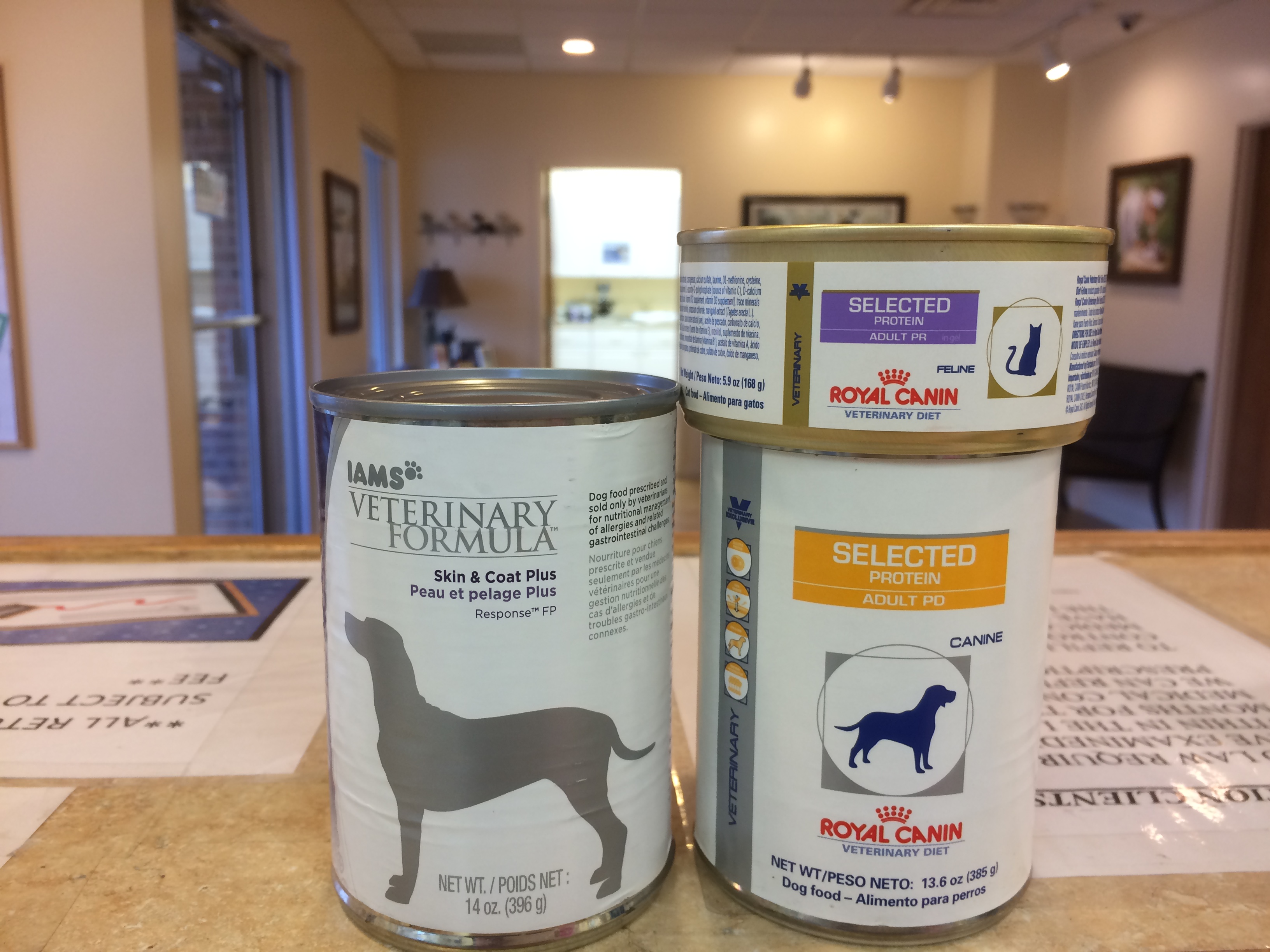
Allergies are one of the most common complaints that we get from pet owners. Allergies are not only uncomfortable for the pet but also very frustrating for the owners. There are different types of allergies: environmental, flea and food. If you would like to do allergy testing on your pet then we can recommend a veterinary dermatologist. If you have a pet with allergies you may make frequent visits to your veterinarian with skin lesions, itchy ears, itchy feet, and anal gland issues. These pets often require an array of routine treatments and medications. In this article we would like to focus on food allergies. If your pet itches year round and cannot find relief, you may want to discuss food allergies with your veterinarian.
With these frequent visits and treatments the expense can start to add up and cause a financial burden. Performing treatments on your pet such as ear cleaning, baths and sprays can be a daunting task for many owners. The sad result for some pets with chronic food allergies is euthanasia. If a food allergy is the underlying cause the result can be a happier dog and a happier owner. Purchasing the prescription diet will be more cost effective than all of the visits to your veterinarian for allergy flare ups.
Pets are typically allergic to the protein source or the carbohydrate source in their pet food. A pet can develop an allergy to their food at any point in time, regardless of how long they have been fed the same dog or cat food. Some pets are okay with transitioning onto an over the counter diet that you can purchase at the pet store that has limited allergens. With a prescription allergy diet we introduce the pet to a novel carbohydrate source and a novel protein source. Some of these diets include- kangaroo and oat, fish and potato, and venison and pea. One of our doctors gives this example: “Are you a person who can eat food that was manufactured in a facility that houses nuts OR are you the type of person who cannot eat anything from a facility that manufactures anything with nuts”. If the answer is you can eat an item manufactured with the allergen (nuts) then an over the counter diet may be the right choice for you. If you are unable to eat anything that is manufactured that comes in contact with the allergen (nuts) then a prescription diet is the best option. This means that the prescription allergy diets are manufactured in a plant that isolates these diets to ensure they are not touching other antigens that could potentially cause a food allergy.
The best way to rule out a food allergy is to start your pet on a prescription food allergy trial. This is when you transition your pet on to the allergy diet that your veterinarian recommends. You then feed that diet and only that diet (no treats, no food puzzles, rawhides, licking the ice cream bowl, etc.). You need to feed ONLY this food for up to 3 months and monitor if your pet’s symptoms have resolved and/or improved. If your pet does not like one of the allergy diets then it is safe to try another diet until you find one palatable to your pet. If you have ruled that the allergy diet works for your pet over time you can challenge the pet by introducing new treats slowly one at a time. If they do not react then that item is safe for them to eat long term. Depending on your level of allergy some pets can introduce things back into their diet, other pets are not able to.
Owners hear the initial cost of a prescription allergy diet and freeze. What is often forgotten is that if the diet works for your pet you will no longer be coming into the veterinarian routinely and this will help save you money. You need to feed your pet food any way so why not spend the little bit of extra money on a diet that can help resolve symptoms? Most owners run out and purchase over the counter diets that claim to be allergy diets. Then are upset that they are not working or claim that they ruled out food allergies. As we mentioned above some of these diets can help make some pets more comfortable. It can be a good first step. But, without a true food allergy trial on a prescription diet then a food allergy cannot be ruled out. The over the counter diets that some owners are inclined to purchase to rule out allergies are actually comparable in price to our prescription diets! Therefore the better choice for your pet would be the allergy diet. Take a look at the comparison charts below with some of the most common diets. We have also included some appointment costs of pets who have known food allergies. These were routine visits for these owners each time their pet had a flare up. After feeding the diets this visits became obsolete or at least less frequent.
| Frequent Patients seen for food allergies | Cost of Vet Visit (SKAH) | # Bags of Food could have been purchased (30lbs KO) |
| Patient A | $320.22 | ~4 |
| Patient B | $179.54 | ~ 2 1/2 |
| Patient C | $238.03 | ~3 |
| Patient D | $372.04 | ~5 |
| Patient E | $103.80 | ~ 1 1/2 |
| Patient F | $197.20 | ~2 1/2 |
| Patient G | $218.20 | ~3 |
| Patient H | $120.50 | ~1 |
| Prescription Diet Cost SKAH 2016 | Over the Counter Large Pet Store Cost 2016 |
| Iams K9 Kangaroo & Oat 30lbs $69.00 | Nutro 30lbs $49.99 |
| Hill’s K9 D/D 27.5lbs $84.92 | K9 Simply Nourish 24lbs $49.99 |
| Royal Canin K9 Potato & Rabbit 17.6lbs $60.29 | K9 Nature’s Recipe 24lbs $51.99 |
| Hill’s K9 Z/D 17.6lbs $66.99 | K9 Blue Buffalo 24lbs $57.99 |
| Royal Canin Fel Pea & Duck 7.7lbs $30.75 | Fel Authority 8lbs $16.99 |
| Hill’s Fel D/D Venison 8.5lbs $48.99 | Fel Blue Buffalo 11lbs $35.99 |
Amanda Siciliano & Dr. Alyssa Auer
Stow Kent Animal Hospital

Portage Animal Clinic
Stow Falls Pet Clinic Inc.
Check out our video by Dr. Albers regarding food allergy diets for more information

